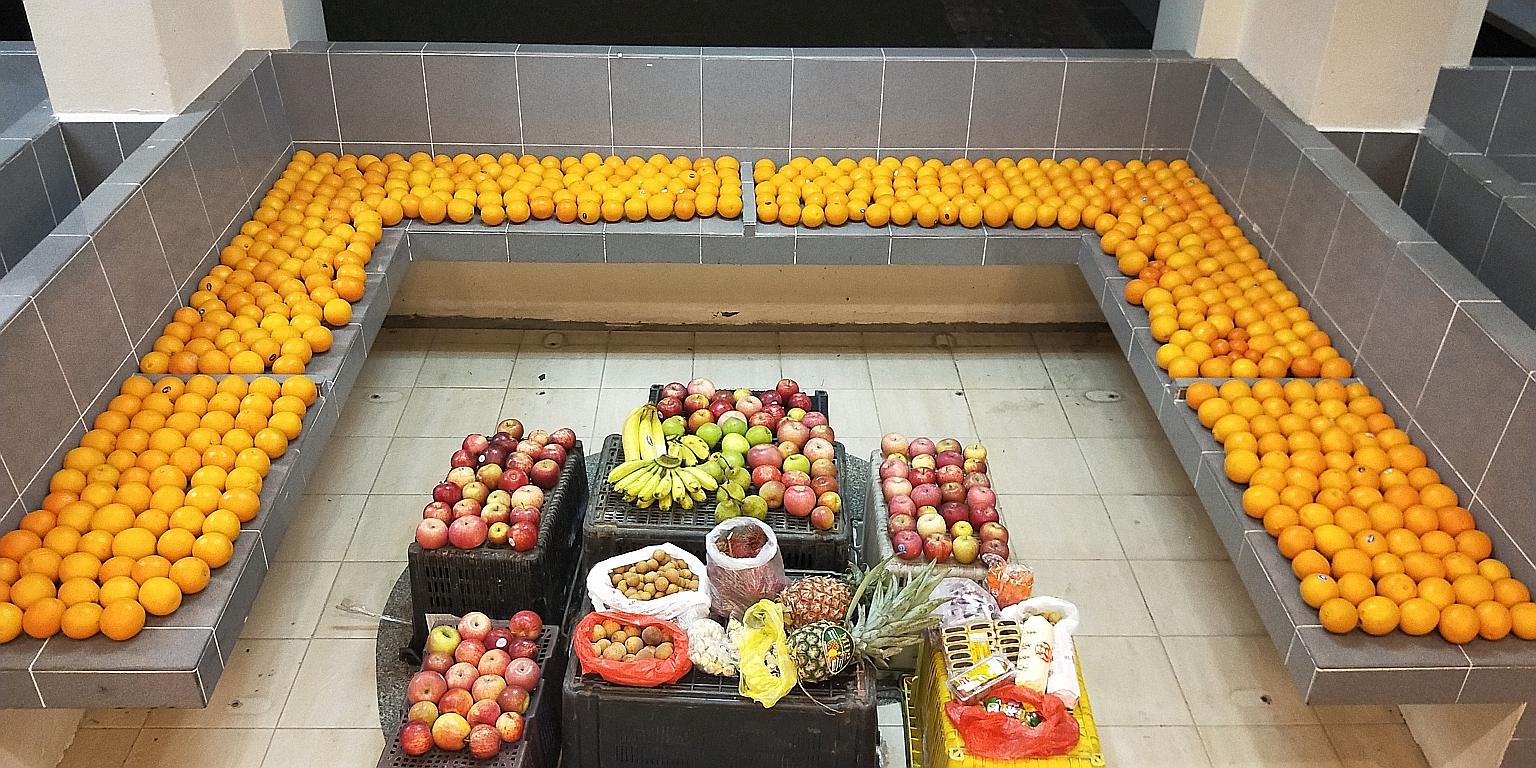Hungry Ghost Festival a fruitful time for 'freegans' roaming the streets
Group named after combined words 'free' and 'vegan' retrieve offerings to reduce wastage
Sign up now: Get ST's newsletters delivered to your inbox

For avid "freegan" Daniel Tay and his friends, fruits make up the bulk of what they collect as they fan out across Housing Board blocks in Ang Mo Kio and Bishan for fresh offerings during the Hungry Ghost Festival.
PHOTO: DANIEL TAY
The belief that food offerings left out during the Hungry Ghost Festival become tasteless after spirits have "consumed" them is not true, said avid "freegan" Daniel Tay.
That is, as long as you get to them relatively quickly, he added. Offerings that have been left out in the sun for several days may naturally lose their taste after being exposed to the elements.
The 41-year-old retired financial adviser speaks from experience. Over three nights, Mr Tay and several of his friends fanned out across Housing Board blocks in Ang Mo Kio and Bishan in search of fresh offerings during the two-week-long Hungry Ghost Festival that ended last Wednesday.
In all, they managed to collect an impressive haul of 726 oranges, along with numerous other fruits.
As a freegan, a combination of the words "free" and "vegan", Mr Tay rejects consumerism and seeks to reduce wastage, especially by retrieving and reusing discarded items.
Fruits make up the bulk of what they collected, Mr Tay explained, because the skin keeps the fruits fresh and they can be easily washed.
"There are a lot of different offerings like drinks, beer, sweets, tau sar piah (a traditional Chinese pastry), and packets of rice, chicken and duck," he noted.
"Most of the time, people open the packets of food when making their offerings, and there are rats going around, so it's not hygienic.
"The ones you take are the ones that are not open, like fruits, where the skin can be washed or peeled off, or wrapped sweets and even otak-otak," he said, referring to grilled fish paste, a local favourite.
Mr Tay first organised an "orange hunt" to retrieve food offerings during last year's festival and managed to scrounge up 130. They were placed beside footpaths and near grass patches in HDB estates.
Since then, he has managed to convince a number of friends and members from a Facebook group called Freegan in Singapore - comprising men and women in their 20s to 50s - to join the hunt.

On his third session this year, an eight-hour jaunt - that lasted from last Wednesday night into the wee hours of Thursday morning, Mr Tay and four friends scooped up 524 oranges, 178 sweets, 146 duku and longans, 108 apples, 24 bananas, 24 rambutans, 12 otak-otak, five pears and two pineapples.
They divided the spoils among themselves and took them home for consumption or to give away to friends and family.
"Of course, we tell them where the fruits came from. If they're not okay with it, never mind. Some within the freegan community have also offered their 'consumption services'," Mr Tay said of people who offer to eat the pickings.
He added that his group is not the only one in Singapore going around collecting offerings to eat.
Mr Tay knows of at least 10 to 15 other people who carry out similar activities in other neighbourhoods like Hougang and Yishun.
Some online commenters have expressed bewilderment or disgust, Mr Tay said, but he saw nothing wrong with what he was doing.
He consulted a Taoist master who advised him to simply be respectful when collecting the offerings, by waiting until the candles and joss sticks have finished burning - signalling that the prayer has ended - and saying a quick word of thanks.
Mr Tay, a free-thinker, said he has been told that traditionally, it was not uncommon for people living in rural areas to consume the food after offering it to spirits or to leave it out for wild animals or poor passers-by to eat.
"In the city, it's different. Leaving food out attracts pests like rodents and cockroaches. In the morning, it is likely the town council cleaners who clear it up and throw it away."
Mr Tan Thiam Lye, chairman of the Taoist Federation, told The Sunday Times yesterday that eating offerings meant for the departed is commonly done when one is paying respects to one's ancestors during the lunar seventh month.
Prior to Covid-19, Taoist temples would place tables within their premises to allow worshippers to eat the food offerings afterwards, said Mr Tan, 70.
He added that this is not currently in practice due to restrictions on the number of people allowed to gather for worship services.
But it is a different matter when it comes to offerings meant for wild ghosts, or ye gui, in Chinese.
"You won't be punished, but it's hard to tell if you will have bad luck from doing so," Mr Tan said.
There are steps that devotees follow before consuming prayer offerings, according to Mr Tan:
- Light the joss sticks
- Burn incense paper that has been prepared
- When half the stack has been burned, cast the jiao bei (divination blocks) and ask your ancestors if they have "eaten"
- If you do not receive a positive answer, try again
- Give thanks and bow as a sign of respect to ancestors
- Bring the food home to consume


